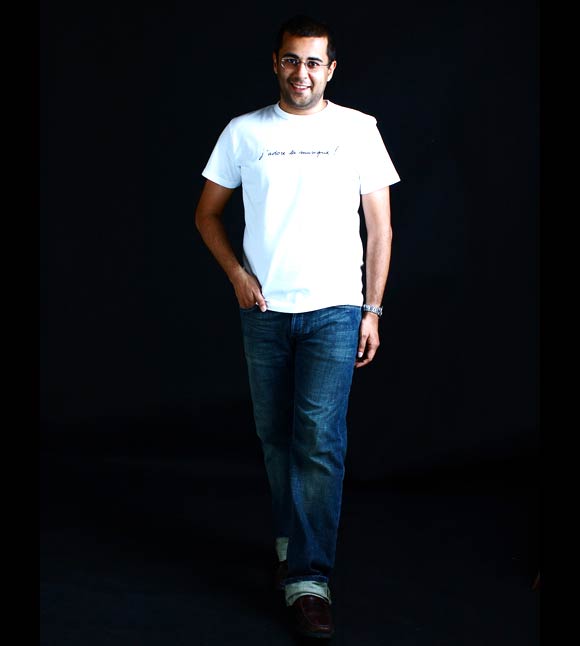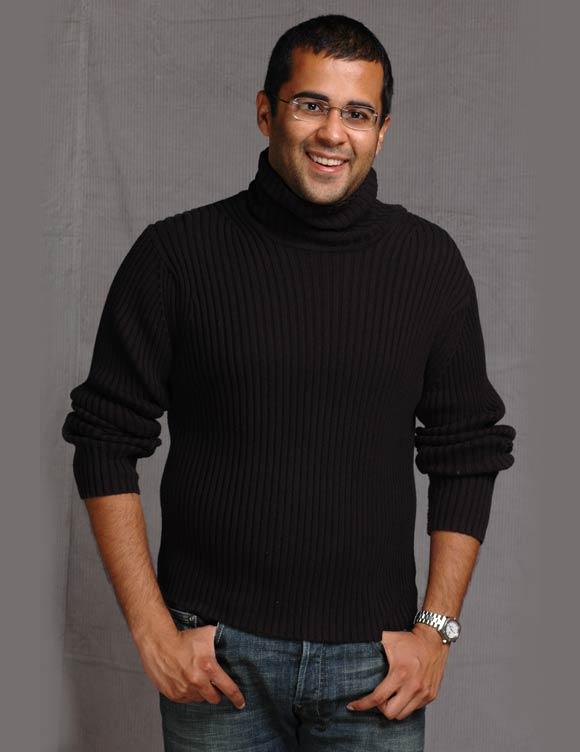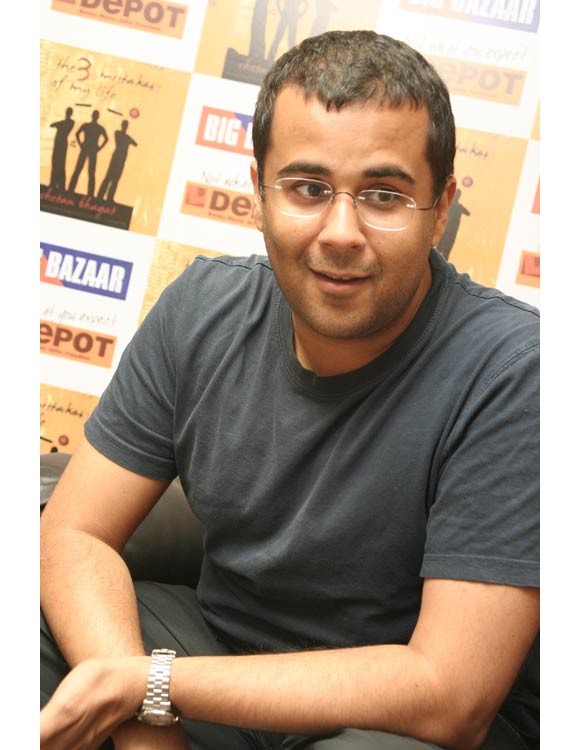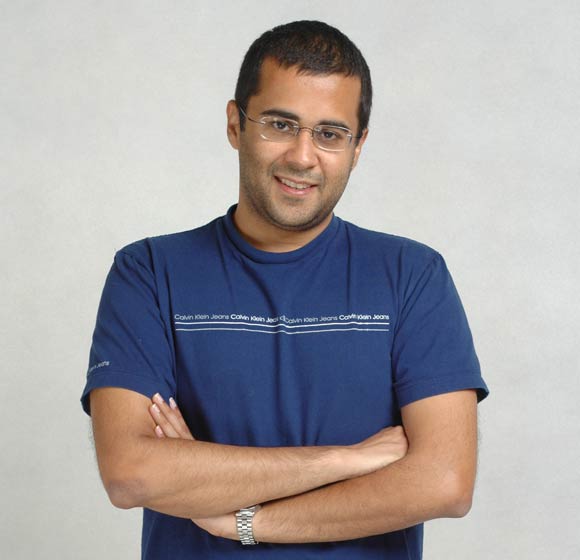
In the second part of our interview with Chetan Bhagat, the author talks about his much-lampooned blogpost about his domestic help as he replies to those who are outraged at the cold-blooded murder of the English tongue.
One of the many things that Chetan Bhagat has been criticised for is the lack of eloquence in his writing. His books, as his critics would say, crass and lowbrow.
Yet the impact he has made on the Indian publishing industry is one that cannot be ignored.
Never before has there been so much focus on Indian writers of pop fiction and whether his critics like to admit it or not, Chetan Bhagat's success has had something to do with this.
In the second part of his interview, Chetan Bhagat talks about English, Rusdhie and the Twitterati who to love to hate him.
(Read Part One of the interview here)
During one of the literature festivals you mentioned that through your writing you hoped to affect change and someone asked you why you weren't a politician...
Yes, that was (Mohammed) Hanif. I feel that is a very narrow view. Nothing against politicians, but I feel I can be more effective outside.
Today, the need for a neutral, unbiased voice is stronger than the need for another MP. Also, I don't want to project any intentions for seeking political power.
How do you see yourself affecting a change without being part of the decision-making body?
Public opinion plays a very important role in democracy. It is a nice dip test of democracy. If I can be someone who can shape public opinion, I can do a lot.
Okay, so you probably cannot do as much as, let's say, the prime minister can, but you know how powerful our prime minister is! You don't want to be in a political system where you have powers above you that will handcuff you.
If I can be independent in a political scenario and be given the independence to do what I want to do, I might consider, but it is unlikely to happen. So I'd rather be on the outside.

Would you say you have in a way democratised the business of writing because there have never been as many writers on the Indian publishing horizon as they are today?
The writers were always there but the publishers are now taking more chances with different genres. They have now opened their minds to newer ideas. But, yes, you could say that.
What kind of impact do you think you have had on the publishing industry?
It's better you ask the publishers that. The focus has now shifted to the domestic market. They are, of course, still interested in the literary stuff, but it is not their priority any more. A Booker Prize is a nice thing but it's not the only thing.
When I was going around, they were looking for that Booker Prize. Today they are not. They are looking for the next domestic bestseller.
Of course the size of the industry has changed. Because publishers now know that millions of copies of a book can be sold, more players have come too.
The advent of literary festivals is a new thing. I don't know the cause and effect, but the industry has grown so literature festivals have grown, or vice versa.
The fact is that books are more relevant and they are more exciting to the average Indian than they were ten years ago, and that is a big change. And I think I have had something to do with it.
Apart from that, it also has to do with me being at the right place and the right time. Some of this would have happened any way because it is just the way India is.
I was quite intrigued by the video of a young couple in bed reading your book. Did you make it?
(Laughs) Some fans made that video. I did tweet about it though.
You didn't have anything to do with it....?
(Laughs) No. I have not created it or paid for it. They asked if I could help promote it. They asked me if I found it funny, and it was. I knew it would be one of those things that some people would like and others wouldn't but it's not an official video.
Do you believe you are more often than not misunderstood? The reason I ask you this is because of the response you got to your blogpost on Twitter where you were lampooned. (Bhagat's post was a reaction to this blogpost by an NRI in The New York Times.)
I am not the kind of guy who reacts to such articles but the reason I did to this one was because I felt that it was stereotyping India.
And while some of it may be true, when an NRI writes for The New York Times, he has an undue reach on the Americans there.
I felt that was another side to this story and so I felt the need to respond. Nothing I wrote was untrue--we have two maids. You can see their room. It has a Tata Sky connection and an air-conditioner. One of them has gone for an English class right now...I knew it was going to come across as... (leaves sentence unfinished)
But it was on my blog and I can write what I want there.
You were trending on Twitter that day, which probably isn't anything new for you...
Yes, because for better or worse, it did affect people. Whatever anyone may say, in my heart the intention was very clear. It reached papers like India Abroad and that was where it had to reach.
That guy had to respond. The New York Times had to do a separate article. I am understood far more than I am misunderstood. What you are focusing on are the 100 people on Twitter.
If you make a table out of the hate tweets you'd probably find that the same 20 people are contributing to about 80-90 per cent of it. That's not being misunderstood. I could do whatever, but they'd still be negative.
They say 'Silly people read his books; stupid people read his books'. And then all of a sudden, Vikram Seth's mom at the Calcutta Lit Fest (Kolkata Book Fair) is praising me. She is an ex Chief Justice! Their argument of who reads my books is demolished right there. I know what kind of people read my books.
But it's okay. I am very happy I did it. I don't respond to columns usually. Even with Salman Rushdie I said no to personal attacks and much to the disappointment of Twitterati I declared peace. I don't believe in personal attacks.

I am glad you brought up Rushdie. You speak of freedom of expression. Do you believe it was fair to muffle Rushdie's voice at the Jaipur Literature Festival?
I have not commented on the individual incidents and writer. I can only talk about broad principles. So whatever Mr Rushdie is saying about what I said about him... is wrong.
I can only talk about a broad issue. Of course, you should not damn books and you should not have laws that prevent free speech. People have the right to do what they want to do but at the same time, it is commonsense to respect local sensibilities.
Every society has its norms. And the only thing I was trying to say is, if you don't respect them, don't expect to be treated like a hero.
If I write an article that is offensive to women, I will be killed on Twitter! Can I say, 'Look at my freedom of expression; celebrate my heroic freedom of expression'? That is what I saw happening.
I have respect for Mr Rushdie but to be expected to be treated as a hero in a society in which he has offended a lot of people is also not possible.
At the same time fundamentalists should be prevented by the police. The media should also not pay attention to what the fundamentalists have to say.
If tomorrow a terrorist says 'I want to blow up Mumbai, let me come on Newshour' and we let him, are we not aggravating the issue?

How much of a role do you believe did the media play in this particular incident?
I won't talk about specific issues, but the media pays special attention to extreme voices because of higher TRPs. The more polarising the voice is, the louder it is heard. People who are trying to be moderate are seen as wishy-washy.
Sometimes it's okay to drum up extreme voices to make the debate more engaging, but sometimes it can destabilise the country.
There was a real risk at several points during the (recently concluded Jaipur Literature) Festival when things could have got out of control. And that is something we should all be responsible for.
Some of us have disproportionate influence. Perhaps it applies to those people more. If I start attacking someone's religion, will it destabilise the country or not? Would we then celebrate my freedom of expression? So, let's just bear in mind what the reality of the country is.
Let's talk about your English that has been criticised quite vehemently...
I am writing in the same language The Times of India writes in or Rediff writes in. I have been writing a column for three years and have written for The Guardian. A lot of international publications have read me and liked me.
So, yes, it is not very eloquent, but that's fine. And it's not of a certain class... of a very high literary novel, but that is not what it is meant to be.
Perhaps it could have been better, but it has obviously not affected my work of reaching people. But I acknowledge it. That's not the reason you wouldn't read (my) book -- for its language.
There is, however, a certain clarity... which is why people read (my work). Perhaps I should put a warning on my books...
Saying what?
(Smiles) I don't know. Perhaps 'Do not expect super eloquence' or something like that...

Tell us about your favourite books.
Let me tell you what I am reading these days. It's this book called Boomerang: Travels in the New Third World by Michael Lewis who has written about why the meltdowns happen etc. The language is simple but it has amazing articulation and insight and is enjoyable to read.
My favourite authors include Ernest Hemmingway, George Orwell and Charles Dickens who have been my role models.
Which books by these authors do you particularly like?
Orwell's Animal Farm. I've read Hemingway's Old Man and the Sea many times over but I like his speeches more than his books. Then there's Dickens' Oliver Twist and Great Expectations of course.
I also like Jane Austen. She created certain plots that are being used to this day. Her Pride and Prejudice plot is standard (in stories/films these days).
Amongst contemporaries I read everything. I also read Twilight to figure out what the fuss was about.
I just read The Bridges of Madison County and The Godfather.
Do you ego surf?
Do I Google myself? Yes, I do! Not very often now because my office has set up alerts, but during the launch of a book I Google a lot to see what reviews I have got and what people are saying.
Is that out of a sense of nervousness? You don't seem to be bothered about what critics think!
Well, I do want to see if what I have said has had the same interpretation. There are times I feel I could have expressed something better. For instance, in the Rushdie issue, my message was hacked and it all got muddled up and I asked myself could I have expressed myself better?

Do you often feel you could explain yourself better?
We all feel that. But at the same time I am happy my opinions are taken seriously and it is my job to make people react.
If I can make people think, there is something that is being done right. The controversies have not been about my personal life; they have been about issues and a controversy is nothing but a difference of opinion.
Yes, but I am taking off on the point where you said you wish you could have expressed yourself a little better on the Rushdie issue and it occurred to me that this man has been badgered on practically every single issue he's taken up...
No, I don't think so. I've written 70 columns and just three or four where there were...
So you don't feel that you are probably falling short in expressing yourself as you did in the Rushdie issue?
Fortunately for me, people have understood me now. I don't know why Mr Rushdie ascribed a false statement to me. So it could just be that he bought what the media (sold), which is a half-hacked quote...
I could express myself better and the media could still twist it. And it's okay. It isn't affecting me.
Also, if there was a generic clumsiness I would have lost my reputation. But it's not. The opinions I express are taken seriously.
News channel editors hold me in a lot of respect. They can call anyone but they call me because they know I am saying things that are relevant.
I have to be able to absorb this. If I can't, how will I change the country? Tomorrow when I want to change things... some people will not want change. However nicely I express it, they will oppose me. What will I do then? Sit down and keep thinking about what I should do?
I am someone who does things and when you do things, people have a problem in life. It's okay; I will learn and they will also learn.